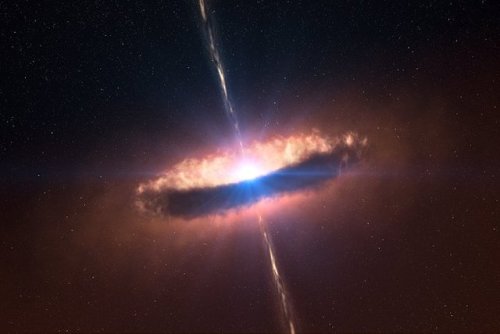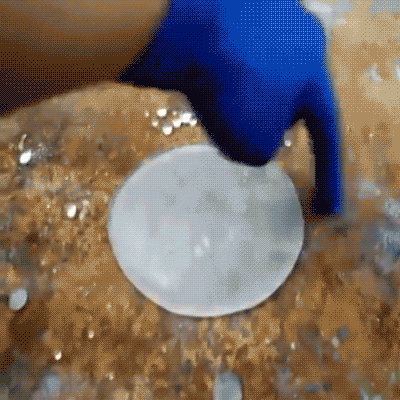What Is A Protostar?




What is a protostar?
The formation of stars begins with the collapse and fragmentation of molecular clouds into very dense clumps. These clumps initially contain ~0.01 solar masses of material, but increase in mass as surrounding material is accumulated through accretion. The temperature of the material also increases while the area over which it is spread decreases as gravitational contraction continues, forming a more stellar-like object in the process. During this time, and up until hydrogen burning begins and it joins the main sequence, the object is known as a protostar.
This stage of stellar evolution may last for between 100,000 and 10 million years depending on the size of the star being formed. If the final result is a protostar with more than 0.08 solar masses, it will go on to begin hydrogen burning and will join the main sequence as a normal star. For protostars with masses less than this, temperatures are not sufficient for hydrogen burning to begin and they become brown dwarf stars.
Protostars are enshrouded in gas and dust and are not detectable at visible wavelengths. To study this very early stage of stellar evolution, astronomers must use infrared or microwave wavelengths.
Protostars are also known as Young Stellar Objects (YSOs).
More Posts from Riekod and Others
Solar System: 10 Things to Know
Movie Night
Summer break is just around the corner. Hang a sheet from the clothesline in the backyard and fire up the projector for a NASA movie night.
1. Mars in a Minute

Back in the day, movies started with a cartoon. Learn the secrets of the Red Planet in these animated 60 second chunks.
2. Crash of the Titans

Watch two galaxies collide billions of years from now in this high-definition visualization.
3. Tour the Moon in 4K

Wait for the dark of the waning Moon next weekend to take in this 4K tour of our constant celestial companion.
4. Seven Years of the Sun

Watch graceful dances in the Sun’s atmosphere in this series of videos created by our 24/7 Sun-sentinel, the Solar Dynamic Observatory (SDO).
5. Light ‘Em Up

Crank up the volume and learn about NASA science for this short video about some of our science missions, featuring a track by Fall Out Boy.
6. Bennu’s Journey

Follow an asteroid from its humble origins to its upcoming encounter with our spacecraft in this stunning visualization.
7. Lunar Landing Practice
Join Apollo mission pilots as they fly—and even crash—during daring practice runs for landing on the Moon.
8. Earthrise

Join the crew of Apollo 8 as they become the first human beings to see the Earth rise over the surface of the Moon.
9. Musical Descent to Titan

Watch a musical, whimsical recreation of the 2005 Huygens probe descent to Titan, Saturn’s giant moon.
10. More Movies

Our Goddard Scientific Visualization Studio provides a steady stream of fresh videos for your summer viewing pleasure. Come back often and enjoy.
Read the full version of this article on the web HERE.
Make sure to follow us on Tumblr for your regular dose of space: http://nasa.tumblr.com.

This is how far into the earth humans have dug so far.













Credit: NASA/ESA/Hubble Space Telescope
While we’re waiting for some hopefully good news that the amazing instrument is returning to service (down since October 5 due to a gyro dyfugalty) here are some of the Hubble Space Telescope’s top pics.
Productivity culture will deceive you (especially if you are particularly high-functioning or a former Gifted Kid) into thinking that any use of your time that can’t be monetized or leveraged for your personal advancement is worthless, and I’m here to tell you that’s the devil talking. Do shit because you like it.
sending your selfies to NASA because you’re a star
As I get older I’m finding that a lot of the “intellectuals” I used to admire are actually just condescending and pretentious. And also realizing how much more important it is to be present, considerate, and empathetic because nobody really knows what they’re talking about and anyone who claims to know everything about anything is feeding you bs.
-
 lesbianmasterchief liked this · 3 months ago
lesbianmasterchief liked this · 3 months ago -
 sochiase liked this · 3 months ago
sochiase liked this · 3 months ago -
 kingslime337 reblogged this · 4 months ago
kingslime337 reblogged this · 4 months ago -
 bcloude liked this · 11 months ago
bcloude liked this · 11 months ago -
 sublimeproxy liked this · 2 years ago
sublimeproxy liked this · 2 years ago -
 moonincapricorn liked this · 2 years ago
moonincapricorn liked this · 2 years ago -
 fireball763 liked this · 3 years ago
fireball763 liked this · 3 years ago -
 onlineengima liked this · 3 years ago
onlineengima liked this · 3 years ago -
 bigpapi504 liked this · 3 years ago
bigpapi504 liked this · 3 years ago -
 princessnijireiki liked this · 3 years ago
princessnijireiki liked this · 3 years ago -
 aerstic-spire reblogged this · 3 years ago
aerstic-spire reblogged this · 3 years ago -
 jabyerah-blog liked this · 3 years ago
jabyerah-blog liked this · 3 years ago -
 lsdrew liked this · 3 years ago
lsdrew liked this · 3 years ago -
 sebastianflores95 liked this · 3 years ago
sebastianflores95 liked this · 3 years ago -
 bigbc420 liked this · 3 years ago
bigbc420 liked this · 3 years ago